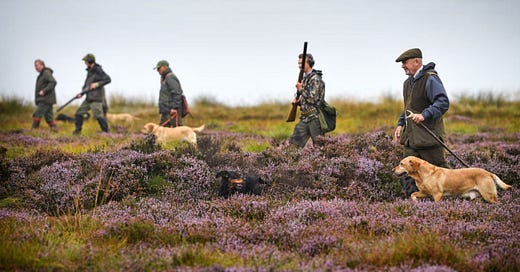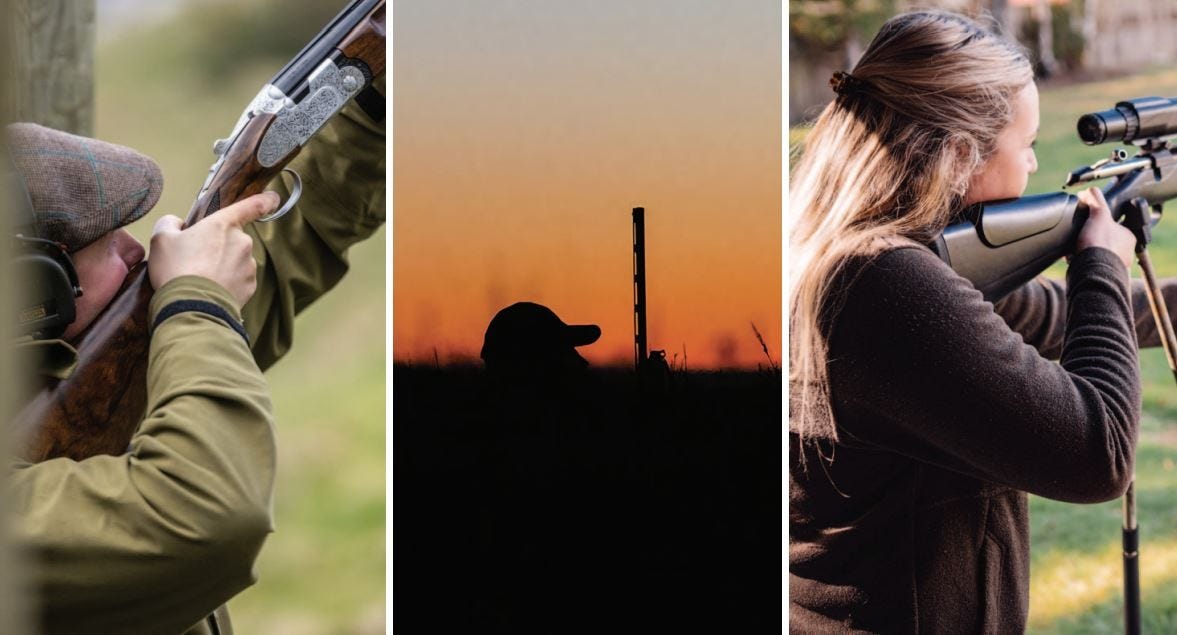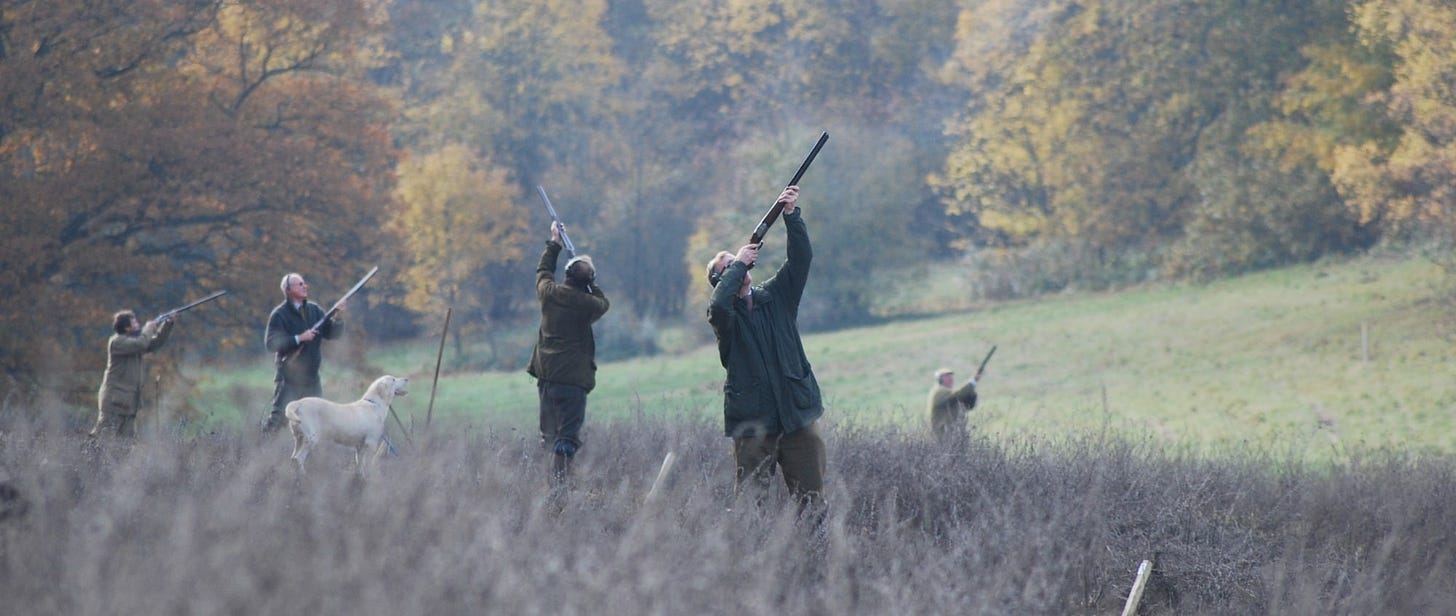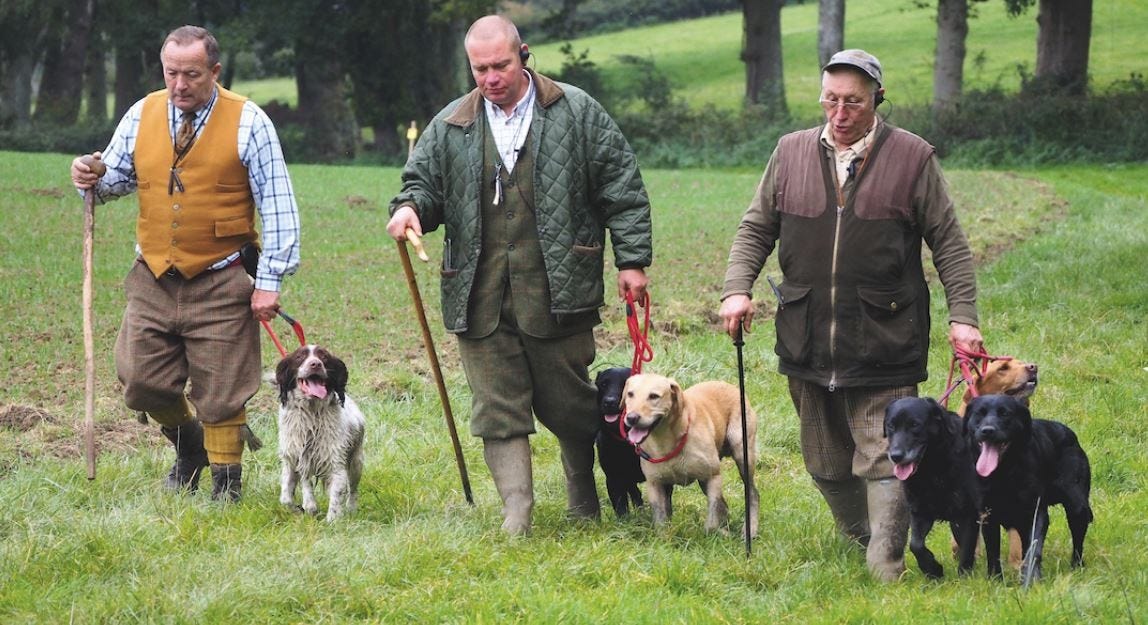A new report does a mind-bogglingly over-the-top marketing job at highlighting the many 'amazing' positives of being pro-gun, pro-hunting and pro-animal slaughter. It goes without saying that the report was bought and paid for by folks who are pro-gun, pro-hunting and pro-animal slaughter.
Just to get us started, the report was published this June with BASC (The British Association for Shooting and Conservation) in the lead. The many organizations partnering with BASC to get this glossy 28-page publication out there are listed in below image. BASC writes that "the report’s findings play an important role in shaping the debate around shooting in the run up to the general election and beyond."
The overall argument is that shooting is "a key component of the rural economy and goes hand-in-hand with the conservation of the countryside." The report of course confirms all of everything the BASC and their many partners wanted to see confirmed - and they put a nice bit of emphasis on the conservation element (just to be clear, I find it deeply objectionable that these organizations give themselves cover by claiming the conservation mantle) - and they even put a big spotlight on the wonderful mental and physical health benefits all of that shooting brings to people (more on these later).
I've only come across this 'report' because a concerned citizen wrote a letter to the Yorkshire Post about the article that had previously highlighted the amazing pro-shooting numbers. He wondered where those huge numbers (such as that 'shooting is worth £3.3bn to the UK economy' and that '620'000 people are actively involved in shooting related activities'). He also questioned the 'conservation work' regarding the burning of grouse moors. In his letter he hopes that the new government will do a better job and that moors will be rewilded and opened up to the general public - so that everyone, not just 'the elite few' can enjoy them.
Here's the 'glorious' 'Value of Shooting' report in full. There's a lot to unpack. The report conflates and and thus confuscates a great deal. Here we go:
Report highlight: Shooting is worth £3.3bn a year
That's quite a number. Shooting estate owners will of course use that number to highlight just how important they are for the many (here's one such example). The big number alas has comparatively little to do with shooting estates. The big number, as the report explains on page 8, is arrived at by the total of money spent by shooters 'on guns, ammunition, sporting clothing and accessories, travel, hospitality and payment to shooting providers. The providers buy materials and services. All this economic activity supports a nationwide supply chain of manufacturers, importers, wholesalers and retailers required to service it.'
As will be shown later on, much of what the shooting industry provides is not connected with the shooting estates and the overall number will thus be a fraction of what they claim. Let's take a closer look:
Tourism
All of the tourism built into that big number would simply happen differently if those shooting estates did not exist. They make the case, always, for the status quo - look, 3.3bn, why change? But if all of those estates were rewilded, they'd be a massive nature boon for ALL OF THE UK and that would come with far more tourism that is brought by those who come to kill animals. Lands of shooting estates could also put to other uses with economic value. So no, the loss of the shooting estates wouldn't mean the loss of billions, it would simply mean a transference - of money spent on shooting before, would then be spent on something else.
Employment
The report highlights that shooting overall supports 67'000 full-time jobs in the UK. When you take a closer look you'll see that the report creators qualified FTEs (full-time employees) as 'employee jobs' and 'full-time equivalent jobs' - suddenly you see that a whopping 38'000 of those 'jobs' are actually unpaid (see below). With the 29'000 remaining paid jobs I can't help but wonder just how much of those estate earnings go to local people, and how much of those go to the owners only. A report ten years ago (more on that report below), highlighted that in fact often such FTEs were below minimum wage.
Types of shooting
Again, traditional shooting estates (for the killing of deer, grouse, pheasant, etc.) will want you to look at the big numbers and say, 'See how important we are to the economy?' ... But here's the thing - there are a lot of people who practice their shooting skill as an actual sport (on target ranges) in different shooting disciplines - and a lot of people frequent clay shooting grounds. As far as I could see in the report, there was no percentage split between given between people not shooting animals and people shooting animals (they call it 'live quarry disciplines' ...)
You can of course argue that many of those that practice on target ranges, will also visit shooting estates to kill animals ... but to me there is a massive uncertainty built into this assumption. I would think that there are a great many people who love shooting, but who would never shoot an animal. Where's that number? All of those people have been packed into the one big number that always comes to the same conclusion: shooting estates are a-ok. Undoubtedly, many shooters would take objection to that.
Animal kills
Of course the report doesn't use words like 'kill' and, God forbid, 'slaughter' - it uses terms such as 'gamebirds taken' ... well, according to the report (I believe the analysis was for 2022) those nature-loving sports people 'took' a total of ELEVEN MILLION FOUR HUNDRED AND FIFTY THOUSAND gamebirds ... even the name, for heaven's sake - gamebirds!?!?
There's more, of course. 'Gamebirds' are by far the most animals killed (65% overall), but that same year they also 'took' ONE MILLION AND ONE HUNDRED THOUSAND wildfowl and SIX HUNDRED AND EIGHTY ONE THOUSAND deer.
And don't think that's all - there are the pests, you see. Pests must be eliminated, because they could harm the populations of animals shooters wish to slaughter later. One such pest is apparently the woodpigeon and so they killed around TWO MILLION FIVE HUNDRED THOUSAND of them. They also shot and killed SEVEN HUNDRED AND TEN THOUSAND corvids, THREE HUNDRED AND SIXTY THOUSAND rats, ONE HUNDRED AND TEN THOUSAND mustelids and FIFTY THOUSAND foxes.
Oh and just to be clear - shooting estates of course consider pest control - the shooting of millions of animals, as part of their hallowed conservation efforts. As the report states, "Shooting provides a huge army of conservationists."
Conservation
This is, beginning to end, a lie. It is an amazingly convenient lie, of course. I see this with animal-killing organizations around the world, this idea that they add conversation to their name and purpose statements. Let's be clear, all anyone on any shooting estate does is to ensure that the shooting estate will continue to be a shooting estate. As such, yes, you could call it conservation. They conserve exactly what is, at all cost. What's good for a healthy biodiversity-rich nature has absolutely nothing to do with it. It's a ruse. The report gives a lot of focus to conservation and paints such a cozy picture. But what do they say about putting lipstick on a pig?
Wellbeing
On page 20 the report looks at physical and mental health ... it highlights that people getting together out in nature is beneficial to both one's mental and physical health ... I mean, who knew, right? Fascinating, we should try it! May you know what, let's do something entirely unreal and get together out there in nature without guns. We could go hiking or bird watching or forest bathing or some such. We'll just enjoy what's there and we won't strive to slaughter it as part of our outdoor fun. How about that?
The report proudly highlights that "It is estimated that the total number of all game, wildfowl and pest species taken during 2022 was 17.6m, which averages 32 head per active participant in shooting activities in the UK."
There are the comparatively few with rifles and there are many more who do the hard work. One might almost think it something stuck in olden times of servitude where nobility got to have their fun and where everybody else, the beaters, the pickers-up, the farm workers and the gamekeepers did the actual work before and during and after the moment when a person with a gun has taken the shot. Indeed, it essentially hasn't changed. My point is simply that all of those people could do things for their mental and physical health, in community with others, by all means - without killing animals. They might feel even better!
The ever-treasured status quo
The report beautifully serve as a high-gloss thumbs-up for anyone who want to say to anyone else: "See? I told you we are super valuable to the economy!" I just came across another report, this one commissioned ten years ago by the League Against Cruel Sports - a report done by actual economic experts, and with actual references (the 'Value of Shooting' report thinks it unnecessary to add references, which just makes it all the more suspect). The League asked experts to look at the claims of a similar report issued by the shooting lobby in 2014 ... Guess what - they came to the same conclusion of massively overblown and conflated numbers. The status quo - keep all as is. It worked then, it'll work now.
The conclusion of the analysis about the shooting lobby's report ten years ago was that the actual benefit to the economy was 60 to 80% lower than the £2bn claimed by the shooting industry. They showed that a large part of the shooting involved no animal killing. They also highlighted that no subsidies given to the sector were deducted, that the 'displacement factor' was entirely ignored and that the average pay of people directly employed in the shooting industry were 'either below the minimum wage or actually paid hobbies.'
Look, I get it. The report discussed above has a clear purpose and that is to showcase that the status quo is just peachy. But take a step back and consider this - what would happen if the shooting estates were gone? The estate owners would want you to believe that this would mean billions of pounds lost to the UK economy. That's rubbish. When shooting participants ten years ago were asked, "If there were no shooting sports, would you spend your money on other leisure activities?" Most people (5 out of 6) said yes. Obviously so, right? When people have money, they want to spend it.
In conclusion
Shooting estates are not essential. They are no boon for the economy. They are in no way shape or form necessary. They are simply what is. Some people love it, some people hate it. A few greatly benefit, most benefit little to nothing. But I get the culture, the tradition, the joy of coming together, the before, the anticipation, nature, the stalking, the tea, the weather - and I also understand the times afterwards, in the clubs, in the pubs, in the restaurants and hotels ... what I'll never understand is that moment when they pull the trigger.
Very long story short - nice report and I sincerely hope that it isn't fooling anyone - and I'm afraid that it does and will). For anyone with an open mind, for anyone not afraid of the inevitability of change, for anyone wanting to tackle the climate and biodiversity crises, for anyone with an actual love for a nature that just wants to be not slaughtered, well, then I hope you remember that these estates must not be. They are a remnant of olden times and that's all. The UK could become a downright paradise on Earth if every such estate land were no longer abused, err, pardon me, I meant conserved, but instead restored and rewilded.
PS: I was wrong - I searched the report and found that the word 'kill' actually appears twice - and that's on page sixteen with 'skills' and 'skilled'. I stand corrected.











